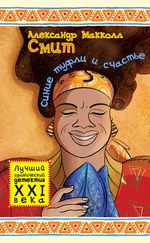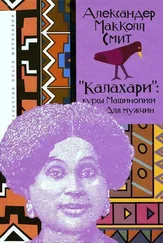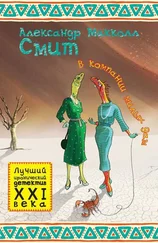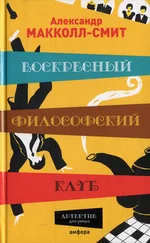‘People are always taking magazines from waiting rooms,’ said Mma Potokwani. ‘Dentists don’t mind about it – they know that it happens all the time.’
‘I intended to take it back.’
Mma Potokwani was sure that Mma Ramotswe had done exactly that, but no, it appeared that she had not. ‘I lost it,’ she said. ‘I read the article about guilt and it made me feel so guilty that I decided to take the magazine back the next day. But then I lost it, Mma. I don’t know what happened to it.’
Mma Potokwani laughed. ‘I thought it told you not to feel guilty.’
‘But I did.’
‘So what happened next?’ asked Mma Potokwani.
‘I bought a new magazine and took it to the waiting room. I told the receptionist that I had bought a present for the waiting room. It was so that other people could enjoy the magazine while they waited to have their teeth looked at. I said that it would take their minds off what lay ahead.’
Mma Potokwani thought that this would have been a great comfort for those facing the dentist’s drill. Mma Ramotswe, though, had more to tell.
‘The receptionist laughed,’ she continued. ‘She said: you must be another of those people who take our magazines and then regret it.’
‘Oh,’ said Mma Potokwani. Then she added, ‘That lady is not very sympathetic, Mma. That was not a kind thing to say to somebody who had stolen a… borrowed a magazine and then felt bad about it.’
With orphans, cake and guilt all disposed of, it was time for Mma Potokwani to broach the subject of Mma Makutsi. ‘Mma Makutsi,’ she said simply, ‘has, I believe, some café or other.’
Mma Ramotswe nodded. ‘She is very proud of it,’ she said. ‘We went there for a meal the other day. She has a chef —’
Mma Potokwani interrupted her. ‘A chef called Disang.’
Mma Ramotswe was cautious. ‘I think he’s called Thomas.’
‘Yes, Thomas Disang.’
Mma Ramotswe looked down at her cup. She feared where this was going. ‘Isn’t Mma Makutsi’s lawyer called Disang?’
‘Yes,’ said Mma Potokwani. ‘That is his name. But it’s also the name of the chef. And of the waiter. And the waitress, for that matter.’
A fresh pot of tea arrived, and Mma Potokwani raised her cup to take a deep draught. She was a quick drinker of tea, and always managed two or three cups to Mma Ramotswe’s one. ‘Yes. They are all Disangs – and they are all relatives of that lawyer of hers.’
‘It is a common name,’ said Mma Ramotswe. ‘There are hundreds of Disangs.’
‘It is certainly a common name,’ agreed Mma Potokwani. ‘But I can tell you this, Mma – those Disangs in that restaurant are all one family. The chef is the lawyer’s brother. The waiter is the chef’s son, and the waitress is the son’s wife.’
Mma Ramotswe reflected on this. It was not uncommon for people to look after their relatives – it was a very African thing. If your cousin was in need, for instance, why not help him? Surely it was wrong, according to the old traditions, to let somebody close to you suffer need. Yes, but… and that but was a very big one. That desire to help was one of the roots of the vine of corruption that had smothered so much of Africa.
‘Does Mma Makutsi know all this?’ asked Mma Ramotswe.
Mma Potokwani shook her head. ‘I do not think she knows. And there is another thing she doesn’t know: that Disang man cannot cook.’
Mma Ramotswe remembered their dinner. ‘But he can cook, Mma. He’s very good. He cooked for us the other night.’
Mma Potokwani shook her head slowly. ‘He did not cook, Mma. That meal was cooked by somebody else.’
‘But he was there in the kitchen,’ protested Mma Ramotswe. ‘They served it to us directly from the kitchen. He was there. I saw him.’
Mma Potokwani poured herself another cup of tea. ‘It was cooked by one of my housemothers,’ she said. ‘She told me.’
Mma Ramotswe stared at her friend. She remembered what Fanwell had said about seeing a woman in the kitchen. She groaned inwardly. ‘You may as well tell me everything, Mma,’ she said.
Mma Potokwani put down her cup. ‘She mentioned it to me casually,’ she said. ‘She wasn’t trying to hide anything. I had gone to inspect her kitchen and had complimented her on her cooking. Then she said that she had recently cooked a meal for some people in a restaurant. She is the aunt of that chef. She said that she was very surprised that he had found a job in a restaurant as he is one of the worst cooks she knows. She also said that he is a good-for-nothing who never sticks at any job.’
‘Oh,’ said Mma Ramotswe. It was all she could think of to say.
‘So I’m afraid those Disangs are taking advantage of Mma Makutsi,’ continued Mma Potokwani. ‘It will end in disaster, I’m afraid.’
Mma Ramotswe sighed. ‘I’m afraid it will, too.’
‘And it gets worse,’ said Mma Potokwani.
‘How can it get worse, Mma?’
Mma Potokwani refilled her teacup. ‘That waiter – the chef’s son – he’s even more hopeless than his father. Apparently he spilled a whole plate of stew over one of the customers yesterday. I heard about it from our infant teacher, who was there. She said there was a terrific row and the waiter stormed off without apologising. The poor customer was covered in stew and had to clean himself up as best he could.’
‘That is not good,’ sighed Mma Ramotswe.
‘And it gets even worse than that,’ said Mma Potokwani. ‘Did you see the Botswana Daily News ? They had something on the front page. It said: Read our restaurant reviewer’s assessment of a new café – in tomorrow’s Daily News .’
Mma Ramotswe tried to be positive. ‘That can help sometimes,’ she said. ‘Often these places really want a review. It can be an advertisement.’
‘Except for one thing,’ said Mma Potokwani. ‘Do you know who has recently become their restaurant reviewer?’ She did not wait for an answer. ‘She signs her reviews with her initials: VS .’
‘VS?’
Mma Potokwani let her friend work it out for herself. A louder sigh came, and that sigh was more of a groan. ‘Violet Sephotho?’ ventured Mma Ramotswe.
Mma Potokwani nodded. ‘I’m afraid so,’ she said.
‘Oh my goodness,’ said Mma Ramotswe. ‘That is very bad.’ She paused. ‘What does that woman know about restaurants?’
‘Nothing,’ said Mma Potokwani. ‘But then many people who write about things know nothing. As you yourself might say, Mma Ramotswe – that is well known. How does Violet get any of her jobs, Mma?’
Mma Ramotswe knew the answer but did not want to spell it out. The two women looked at one another – they understood.
‘She must know a journalist,’ said Mma Potokwani. ‘She must know one of those journalists very well.’
Nothing more needed to be said. Violet Sephotho, sworn enemy of Mma Makutsi and graduate of the Botswana Secretarial College with barely fifty per cent in the final examinations, was incorrigible. There was no low to which she would not stoop in pursuit of her ambitions, which were money and men, in either order. The two goals, in fact, were intertwined: men brought money, or if they did not, they were not the sort of men in whom Violet was interested.
Mma Ramotswe stared out of the window of the Equatorial Café as this new piece of information sank in. Gaborone, although a city, was really a small town, as most cities were. Everybody read the Botswana Daily News and bad publicity in that quarter would kill Mma Makutsi’s restaurant stone dead. People believed what they read – for the most part – and few, if any, of them would know that the initials VS stood for Violet Sephotho. And even if they did, not everybody knew about Violet’s track record and would assume that a restaurant review would be written by somebody who had all the necessary experience and judgement to write such a thing. VS… that could stand for Very Suspect , thought Mma Ramotswe, or perhaps Very Spiteful .
Читать дальше







![Александр Макколл Смит - Отдел деликатных расследований [litres]](/books/397661/aleksandr-makkoll-smit-otdel-delikatnyh-rassledova-thumb.webp)




